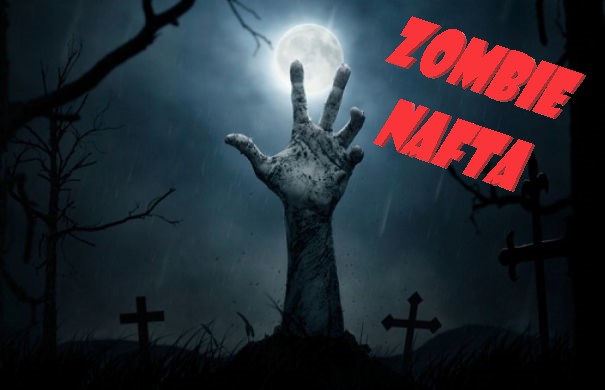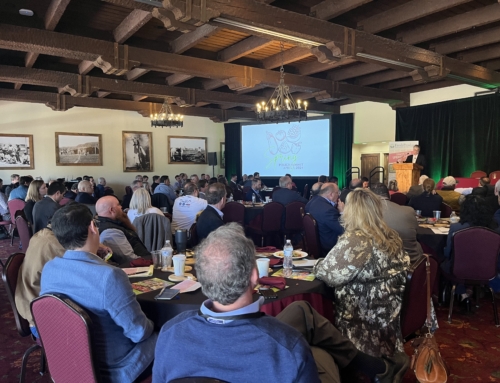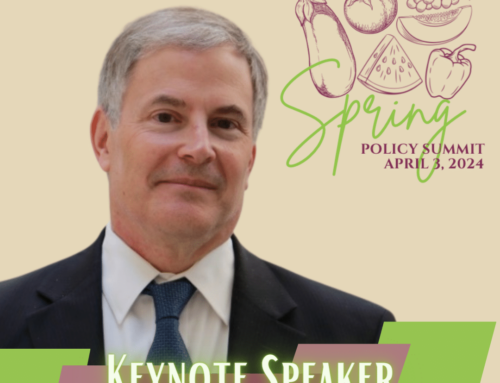The world, as we know it, has ended. Society is not what it once was. Instead of fruitful international investment opportunities, we see a desolate economic landscape plagued with danger and uncertainty. Hordes of angry consumers are cursed to pay higher prices for products they once took for granted. An apocalyptic disaster of biblical proportion.
No, I’m not talking about the next upcoming undead Hollywood blockbuster. I’m talking about reality, or at least what could be reality if negotiators rush into a sloppy resolution on the North American Free Trade Agreement, resulting in what some experts are calling a “Zombie NAFTA.”
This doesn’t mean that North America will experience a zombie apocalypse if NAFTA dies. What it does mean, is that with the state of the NAFTA negotiations in the balance, and pressure building on all fronts to resolve the issue quickly, we may end up with a Trade Agreement that’s not quite dead, yet not quite living either. Undead, if you will.

Gary Clyde Hufbauer
This was one of many topics discussed during the 2018 FPAA Spring Policy Summit. Although many of the presenters discussed the danger and uncertainty surrounding the NAFTA renegotiations, celebrated economist Gary Hufbauer, may have placed a little more emphasis on the risks of an “undead” free trade agreement.
As it is, many involved in trade between the three NAFTA nations are experiencing uncomfortable levels of uncertainty. With so called “poison pill” policies on the table like the sunset clause, changes in auto rules of origin, and a seasonal-perishable provision (something that Hufbauer has spoken out against before. -> Click here <- to read his thoughts on the issue), existing supply lines are at risk of being completely upended.
And the pressure to come up with a quick solution is rising.
Coming up in just a couple of months Mexico will hold its presidential election and leading in the polls is left leaning Andres Manuel Lopez Obrador, who boasts Trump-like protectionist policies. In addition to this, the United States will be holding its midterm elections in November. Republican approval ratings are on the decline, and incumbents are desperate to retain the majority in both houses. The longer these negotiations drag on, the less likely that is to happen.
Trump has constantly reiterated his tired threat to tear up NAFTA all together, and these threats have a lot of industries scared and preparing for the worst in true “Prepper” fashion. But instead of building underground shelters and investing in gallons of zombie repellent, they’re rallying on Capitol Hill, or in Mexico and Canada’s case, looking to countries outside the agreement for imports/exports.
But people are wondering whether Trump really has authority to ditch the agreement, or if NAFTA’s fate depends on Congress? This is where the danger of a “Zombie NAFTA” really comes in.
Let’s say for a moment Trump does make the decision to effectively remove the US from NAFTA. The agreement’s fate may yet remain uncertain for years to come. This month, Trump will have to renew the Trade Promotion Authority, which grants him sole power to make decisions regarding trade. Even if he files for the extension, either house of Congress can still block the motion, dnd members of Congress on both sides of the aisle have repeatedly spoken out against Trump’s trade policies.
And there it is; the North American trade block trapped in a never-ending state of limbo; supply lines in a constant state of uncertainty. Then there’s us: the farmer who sells grains to Mexico or cattle to Canada; the factory worker who uses Canadian steel to manufacture equipment for the US military; the restaurant owner who always gets the freshest fruits and vegetables straight from Mexico; and the average American consumer who has to deal with fluctuating prices and inconsistent availability of the products they’re used to having unfettered access to.
That is a “Zombie NAFTA”.
Now there’s always the chance that things won’t change all that much. But if a lab (the government) develops a pill (provision) that might cure cancer (bring jobs back to the states), but pharmaceutical experts (economists) say there’s much more risk of it turning everyone into mindless monsters(backfiring horribly and damaging the US economy), do you listen to a lab (the feds and their cronies) that stands to make millions, or the experts trying to prevent the extinction of the human race (another recession or worse)?
I don’t know about you, but I’d listen to the experts.
Author: Chris Ciruli – Ciruli Bros

Chris Ciruli






